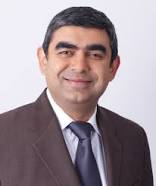Infosys expects revenue growth rate in the second quarter to be better than in the first, chief executive officer Vishal Sikka told  analysts on Friday, but said the company will wait until October before prognosticating for the financial year which ends in March 2017.
analysts on Friday, but said the company will wait until October before prognosticating for the financial year which ends in March 2017.
In July, India’s second-largest software company reduced its fiscal 2017 guidance to 10.5-12% in constant currency terms from the 11.5-13.5% it had projected at the end of the last financial year. After the Bengaluru-headquartered IT company said its multimillion-pound deal with Royal Bank of Scotland had been terminated, analysts had said the company would likely have to cut its forecast once more.
Speaking at Infosys’ ‘Analyst Day’ meet in Pune, Sikka said the company is also looking at ways to offset the loss of RBS contract. “We can confidently say that Q2 growth will be better than Q1. And the way the quarter ends will be important for the guidance. We have another five weeks of execution until the end of the quarter, so clarity on the guidance will only come in October,” he said.
Infosys’ top line grew by 2.2% sequentially in the first quarter. The lowering of the revenue growth forecast was the first major piece of bad news under Sikka, a former SAP technology chief who became the first non-founder CEO of Infosys two years ago. He has championed automation and put in place programmes to raise skill levels while implementing what he has dubbed a ‘renew and new’ strategy. Since August 1, 2014, when Sikka took over as CEO, the company’s share price has increased by 22%. But since June this year, the stock has fallen by nearly 19% as investors fret about demand for software services and Infosys’ ability to implement its strategy.
Commentary was mixed at the event, although the company now expects its Finacle and India business to grow in Q2. It has arrested the slump in consulting, and Sikka said Infosys is seeing the initial impact of the Brexit vote. “We are seeing the early signs. Clients are cautious and the RBS issue was part of that. There is caution in pockets,” he said.
Sikka also sought to allay concerns about the exits of executives from senior ranks in the past few months, ascribing these to performance. The latest to leave was Manish Tandon, who was overseeing the healthcare, insurance and life sciences business units.
Sikka said the company had no problems attracting talent and announced the appointment of IBM executive Sanat Rao as head of the company’s Finacle banking solutions business. Rao is a former Infosys veteran who has spent 13 years with the Bengaluru company. After the exits of senior management personnel, Infosys had centralised its businesses under its presidents, something that analysts had been increasingly concerned about.
“An attempt to concentrate too much responsibility (or several portfolios) in fewer hands in large companies runs the risk of overburdening top management; which is not a good thing, especially today when the outlook for India IT services/outsourcing is turning more sluggish. In our view, Infosys is quite centralised at the top already and does not require another dose of centralisation,” Viju George, an analyst with JPMorgan, said in a note dated August 18. Sikka specifically addressed those issues saying the company had come up with a way to mitigate centralisation.
“We are creating smaller business units with about $500-700 million in revenue that will be managed by the next rung of leadership. This will leave the presidents free to the take more strategic initiatives,” Sikka said. Industry experts said the focus that new units would bring would be a positive for Infosys .
“Strategically, I would say this is a good thing because then you could have more focus. For me, the central point is whether this improves service delivery and effectiveness,” said Tom Reuner, vice president at IT consultancy HfS. As part of its drive to build up the next generation of talent, Infosys announced a long-awaited leader for its Infosys Leadership Institute. Chief operating officer Pravin Rao said the company has appointed former Symantec executive Robin Kirby to lead its leadership efforts.








